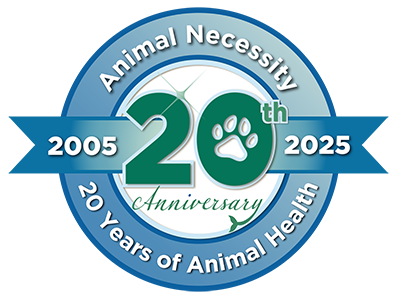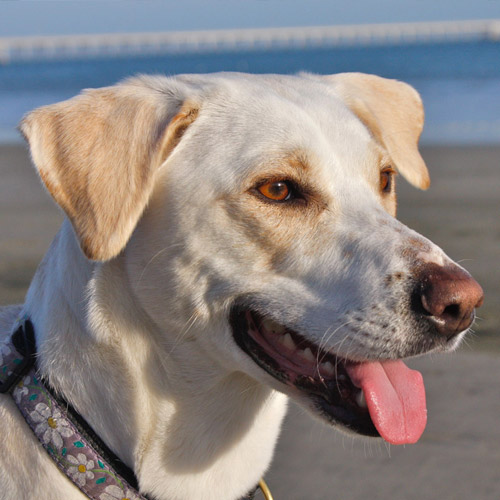
Hey there. I just wanted to reach out to you guys to share my sweet Daisy’s story and how Ocu-GLO has changed her (and my) life. Three years ago this month, my then 7 year old, mixed breed furry friend was diagnosed by a veterinary ophthalmologist with advanced Progressive Retinal Atrophy. Upon hearing the dreaded words, ‘Prepare yourself, she’ll be completely blind soon', I broke down in tears.
The doctor tried to assure me dogs adjust really well to blindness, that it’s their human counterparts that take it the hardest. I asked if there was anything I could do, (meds, surgery, supplements, dietary changes) to reverse or treat the condition and was told it’s untreatable and irreversible. My heart sank and the tears began falling down my cheeks again as I held Daisy to my chest.
The Dr. mentioned she wasn’t a real believer in supplements, but there was one product out there that may slow the progression of the atrophy. I told her I’ll try anything and everything to keep my sweet girl out on nature’s trails and beaches with me. We left the office that day with a bottle of OcuGLO. Since then, I’ve religiously given Daisy 2 capsules a day, 1 with breakfast and 1 with dinner.
I’m happy to report, according to our ophthalmologist, Daisy’s vision has only slightly deteriorated since that initial diagnosis over 3 years ago. The Dr. called it a miracle that she still has her vision and said she’ll start recommending OcuGLO for her PRA patients. Thank you to all of you in the OcuGLO family for giving me hope and giving my girl a few more years of sight. You’ve truly changed our lives!
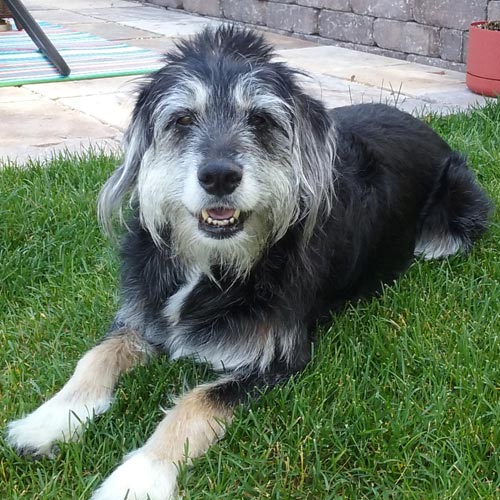
About a year and a half ago, our dog Murray was diagnosed with diabetes. Knowing that the majority of dogs go blind quickly, we immediately made an appointment with an ophthalmologist to get a baseline on his eyes. He didn't have cataracts yet, but the vet recommended we start him on Ocu-GLO™ ASAP, which we did.
His eye health remained the same until Murray had to be hospitalized for IMHA, a serious auto-immune disease. He needed transfusions and a barrage of medication, so we discontinued the Ocu-GLO™ for a few weeks. During that time, we noticed a significant decrease in his vision. He was bumping into things, not seeing treats or toys right in front of him and tripping up the steps. Returning to the ophthalmologist, he was now diagnosed with retinal degeneration.
Once his health improved, we started giving him Ocu-GLO™ again, and I'm thrilled to report that his vision has greatly improved and it's very obvious that he can see much better again. It has been a few months, but there has been no change in the retinal degeneration or the appearance of cataracts, which is very unusual for a dog with his health issues (he also has hypothyroidism and ITP, a platelet disorder).
Murray is living proof that Ocu-GLO™ is responsible for his healthy eyes. We couldn't be happier and will continue to give him this supplement for the rest of his life.
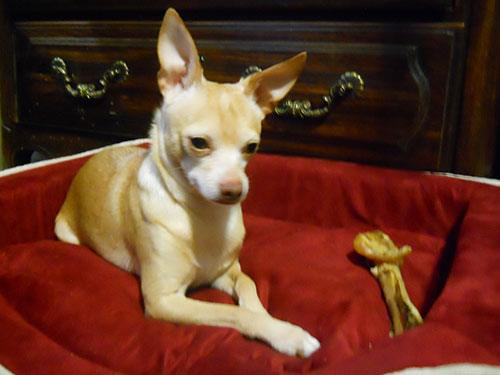
I have a 5 year old chihuahua named Rocco. As you may know, chihuahuas are prone to a condition called "Luxating Patella" where the knee joint slips out of place. My dog has a grade 1 slipping patella on one side, and a grade 2 in the other. This didn't appear until he was 3 years old, and while it causes him no pain, sometimes his knee gets stuck and the only way to put it back is to tip him upright and then back down. (I'm sure there is a fancier way of doing it, but this is what we can do.)
My boss, Lyn Borcherding, recommended your supplement for joint issues, and we tried it on Rocco. Since about a week after he started taking the supplement, his leg has not gotten 'stuck'. He has had no issues for about 3 months now, and he used to have at least two incidents a week.
Since luxating patella is usually caused by a genetic issue (the groove is too shallow, or something like that) it's really surprising to me that your supplement has had any affect at all, but it has. You can turn on and off his bad leg simply by choosing to give him the supplement or not. He is, of course, on this supplement permanently now, but I would love to know what ingredient you think is so powerful that it would overcome a problem like Rocco's.
Thank you for your time, Andrea
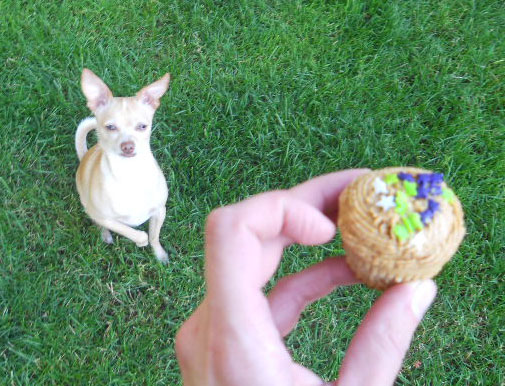
Follow-up from the Animal Necessity Scientific Advisory Team:
There is not just one ingredient, but rather the blend of ingredients in Joint Guard Vet that works to help animals such as Rocco. Patellar luxation is a chronic, genetic, congenital, or traumatic condition that over time will cause arthritic changes, and the inflamed joint will cause ligament breakdown. Therefore, by supplementing with the ingredients in Joint Guard Vet we help support the normal structure of the joint and keep it healthy.
The vitamin C used (Pure-way C) is rapidly absorbed and maintains higher plasma levels in comparison to other ascorbic acids; vitamin C is necessary for collagen synthesis.
There are various ingredients that help to form glycosaminoglycans which have anti-inflammatory properties needed for proteoglycan synthesis, found normally in synovial fluid (joint fluid).
MSM is a source of sulfur required for collagen synthesis and may inhibit pain impulses traveling along the nerve fibers, therefore having analgesic properties.
A blend of bioflavonoids has been chosen because of the strong antioxidant properties which inhibit inflammation and damaging enzymes.
Manganese is also an essential cofactor in the synthesis of glycosaminoglycans, collagen and proteoglycans to form the organic matrix of bone.
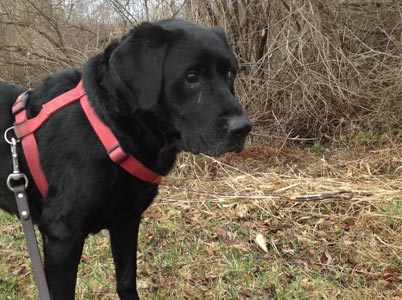
I adopted a five year old black Labrador almost two years ago. "Beale" was completely blind with cataracts. I was told by two veterinarians and one eye specialist that he would not see and there was no expectation that surgery would help. His eyes were too damaged. The best I could do was administer drops preventing the development of glaucoma. About one year ago I received a call from the specialist at Veterinary Emergency Specialists (Dr. Lackner) in Massachusetts. Dr. Lackner attended a conference where she heard about Ocu-GLO. Based on what she heard she suggested I begin giving this supplement to Beale in the hopes his eye health would improve sufficiently so that he would be eligible for cataract surgery. After about eight months, test results were positive. At least one eye showed some measure of responsiveness to light and the retina appeared intact. Surgery was done on one eye in February of this year and now Beale is able to see shapes for the first time since I've had him.
I wanted to thank you for this product... and to let other guardians of blind dogs know there may be hope when you think there is none. Beale is more lively, more independent and bumping into things far less than before. He sits in the yard looking around, moving his head in wide sweeps - apparently "taking it all in" - he doesn't exactly say it but I believe he's happier than before! Thank you.
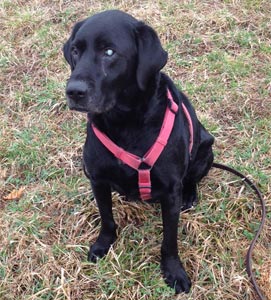
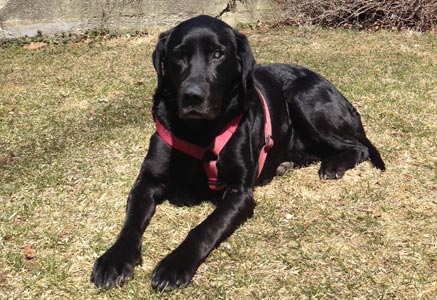
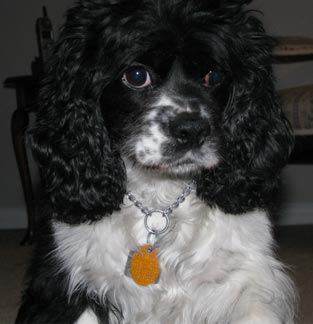
Our American Cocker Spaniel Oreo, was diagnosed with Progressive Retinal Atrophy (PRA) in early February 2012 at the age of 6 years. I happened to be with her when she lost the sight in her left eye and an immediate trip to the vet brought a diagnosis of PRA. We were advised that she was blind in her left eye and that there was noticeable degeneration of the blood vessels in her right eye. I immediately researched PRA online and discovered the Ocu-GLO™ vision supplement, which Oreo began taking by the end of February. In May 2012, we noticed that Oreo's blind eye appeared to be completely dilated all the time and had stopped reacting to light. If she sat in bright sunlight, the upper and lower lids of her right eye would narrow while the left eye remained completely unaffected - so it frequently drew our attention to the blind eye.
In June 2012, at Oreo's annual check-up, the vet was surprised that the blood vessels in Oreo's right eye seemed relatively healthy. Much to our surprise, in July 2012, we noticed that Oreo's blind eye had started reacting to light again. Not only is the pupil of the blind eye now reacting to bright light (although not to the same degree as the eye with vision), the lids of both eyes now seem to narrow equally in bright light! We gather that Oreo's night vision is somewhat limited as she will no longer venture past the lighted area in our back yard after dark, but she still seems to be able to see quite well in low light.
When first I researched PRA I learned that "the time frame until a dog goes blind varies considerably from dog to dog", that all untreated dogs with PRA will eventually go blind and usually "complete blindness occurs within one year of diagnosis". I gather that before Ocu-GLO™, there was no treatment available for PRA. While Ocu-GLO™ does not claim to prevent or to cure PRA, the literature I read states that usage of this antioxidant supplement may "help slow the deterioration of the retina to 'buy some time' visually". While I believe it would be unrealistic to expect that Oreo will regain the vision in her blind eye, I am very encouraged by the fact that there appears to be some improvement in the retinal health of her good eye. One of Oreo's favorite activities is to look out our front window and protect our home from the rabbits and squirrels that frequent our front yard. Oreo has been receiving the supplements for 5 months now and I am very pleased with results to date. I am hoping that through the continued use of Ocu-GLO™, she may maintain her eyesight for a couple more years and prolong her ability to chase balls and her animal-watching activities.
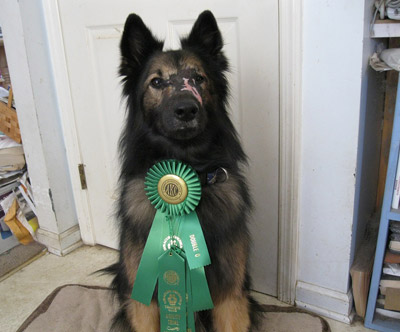
My Belgian Tervuren, Hokey, has been a bit jinxed in life. In September of 2009, he was diagnosed with an aggressive lymphoma. Chemotherapy seems to have dealt with that. Then in October of 2011, a nasal cancer (chondrosarcoma) showed up in the left side of his nose. Radiation was the only treatment and I was warned that his vision would suffer due to radiation scatter. By the end of his radiation treatments, pigment was growing across his left eye. Along with his eye medications (cyclopsorine and an antibiotic), I put him on Ocu-GLO™, which I had used for my older dogs.
I was told that medication might slow down or stop the progression, but that Hokey was likely to lose his vision. At his one-month check-up, the Cornell ophthamologist described it as almost miraculous. Hokey's eye is perfectly normal and in fact, he passed his CERF exam (Canine Eye Registration Foundation). This past weekend, Hokey ran in Excellent agility at my club's trials and earned his first Double Q! His face still needs to pigment in and grow hair from the radiation side effects but he can certainly see!
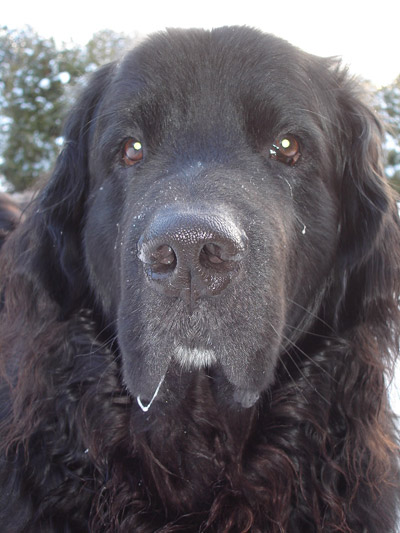
Buddy, our male Newfoundland, came to us as a rescue dog at approximately 1 year of age. He had been in three homes before we first decided to foster him as we searched for a new and permanent home. He was a 120-pound ball of anxiety. The first few weeks were very challenging, as he had not had much interaction with females and he was highly anxious that he was going to be dumped yet again. We fell in love with him and decided we would keep him and welcome him to our home. We had lost both our beloved dog and cat on the same day only a month before, and we were so grief-stricken that we swore we wanted no more pets. However, Buddy was a few doors down at a farm and it was quite apparent he was not a farm type of dog. So we fostered him and fell in love with him - we feel he rescued us far more than we ever did him.
I am quite sure that previous owners got rid of him when they discovered he had PRA. A giant-breed blind dog probably would scare most people. We tackled his eyes as we have most of our health issues. After we consulted an animal ophthalmologist, we also consulted our naturopath and researched homeopathics, herbs and supplements, as well as began a very good diet. We were using human supplements. We also took care of Buddy's emotional needs, which improved his overall health.
By chance, I came across the website for Ocu-GLO™. I was so excited to find a product that had been designed by experts in animal health and was meant for dogs. As animals absorb products differently than humans, I knew this had to be a much better fit for Buddy. We have been using the product for over six months and Buddy has healthy eyes, in spite of his PRA and cataracts. Our vet doesn't understand how, but Buddy can see even though he has the big bright green glow from the PRA and the fog from the cataracts. He doesn't get eye infections anymore and there is less brown 'goo' from the eyes. Although both of these conditions cannot be reversed, we feel hopeful that Ocu-GLO™ is slowing the progression and at least allowing Buddy to enjoy the world through his eyes.
In the end, Buddy rescued us in so many ways. It is now our job to keep this 160-pound Newfoundland healthy, happy and loved. It is a job that I love to do.
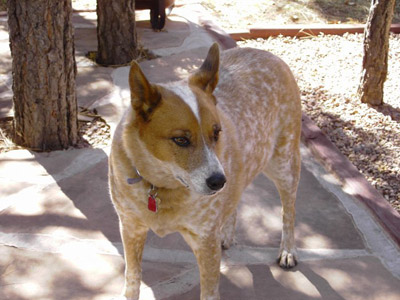
We have had Taffy, our 10-year-old Queensland Heeler, on Ocu-GLO™ for about two years. We were told when her PRA was diagnosed that she would lose her sight completely within a year. It's been two years now and, although she can't see at night, she still sees during the day and you would never know she has a problem with sight. It breaks our hearts to know that she can't see during the night, but we know that if we don't move things around or change her environment, she does very well. Thanks to Ocu-GLO™, we truly believe that it has slowed down her PRA and, even if it only helps her see for a few extra months, it's worth it to her and us.
Update August 11, 2011:
We have had Taffy on Ocu-GLO™ for at least 3 years and during that time her vision has not diminished completely. We were told that after her diagnosis with PRD she would be blind within a year. Well, happily, she has kept some of her vision; enough to see to get around, eat and play. At night, she has problems seeing and bumps into many objects, but, during daylight hours, she gets around and even spots strange dogs trying to come in to her territory. It appears that she has problems with seeing things up close but has the ability to see dogs, people and cars in the distance. It's possible that she is only seeing movement but, regardless, SHE SEES SOMETHING and for that we're grateful. Thanks to Ocu-GLO™, she has been able to keep some sight that may have been destroyed without it.

My 7-year-old English Cocker Spaniel, Darcy, first showed signs of his eyes not reacting to light in August of 2009. In April of 2010, Darcy was diagnosed with PRA and early stages of cataracts. The thought of Darcy losing his vision devastated me as I imagined how he would feel when his vision slowly deteriorated. He has been our little miracle boy and has been, and come through, a lot. The eye specialist recommended Ocu-GLO™; I immediately visited their website and felt so much better and more positive after reading about the product and the testimonials. I was so excited that there was something on the market that could help Darcy. He was already on an allergy supplement and a multi-vitamin, and after reading the FAQs, I emailed Dr. Colitz to inquire about the dosage of Ocu-GLO™ (to ensure he did not get too much vitamin E and grapeseed extract). Dr. Colitz responded promptly and advised me the best way to go.
Since Darcy has been on Ocu-GLO™, there does not seem to be any indication that his PRA and cataracts have progressed, and Darcy does not show any signs that his vision is deteriorating (touch wood!). In fact, he still sits on the top of the sofa, looking out the window, patiently waiting for people and dogs to walk by. Even at nighttime, he can see if someone is walking up/down the street or something is in the front yard. He runs around the house and our store, walks around an object if it's in his way, can see right across the park when other dogs enter, and loves to hang out the car window (he always acknowledges when he sees a dog, person, cyclist, etc.). Additionally, Darcy suffers from dry eyes, but since he has been on Ocu-GLO™ (I also give him a couple of eye drops per day as recommended by my vet), he is producing more tears and his nose is not so dry.
My vet told me they had expected Darcy to lose his sight by now, as it has nearly been a year since his condition was detected. A huge thanks to everyone at Animal HealthQuest for developing Ocu-GLO™ - you have given us (and Darcy, too) hope that this fantastic product will slow or even stop his cataracts and the progression of PRA.

In the course of a single day in November of 2007, our Jack Russell Terrier, Maxx, went from having a slight eye squint in the afternoon to being virtually blind by 10 p.m. The emergency veterinarian told us that Maxx had glaucoma and we would be lucky if she wasn't irreversibly blind by morning. Also, if she still had vision by morning, Maxx would need to see a veterinary ophthalmologist first thing the next day. Eight hours earlier, I didn't know dogs could get glaucoma or that there were eye specialists for our furry family members. After two morning consultations with the ophthalmologist and hours of treatment, Maxx could see but her vision was in serious trouble. Within a couple of days, she had laser surgery to help control the glaucoma in her left eye. Six weeks later, Maxx's left eye underwent additional surgery due to uncontrollable glaucoma. Instead of the eye being removed, an intraocular prosthesis was surgically placed inside the eye to improve the cosmetic appearance, and it looks great! Thankfully, her right eye was still visual.
Maxx had routine recoveries from her surgeries and made a strong comeback throughout 2008. However, in late 2008, the glaucoma in her right eye was no longer controlled by medication, so we elected for Maxx to undergo endolaser surgery. This was performed by our wonderful ophthalmologist, Dr. Victoria Jones, with the assistance of her staff at Northwest Animal Eye Specialists, all of whom Maxx and we had come to trust and rely on to help keep her vision. Following her surgery, Dr. Jones (who knows one of the inventors of Ocu-GLO™) recommended that Maxx start taking the predecessor to Ocu-GLO™, a vision softchew "treat" that was available through a local compounding pharmacy until Ocu-GLO™ GelCaps were available in December of 2009. Dr. Jones believed this supplement might help support Maxx's recovery and her long-term eye health. As pet owners who embrace holistic veterinary care for our pets, we were excited to learn more and get Maxx on this special antioxidant supplement.
A few months later, our other Jack Russell, Sophie, who is now 11, was having some trouble seeing in low light (called senile retinal degeneration). Dr. Jones suggested we begin Sophie on the supplement too.
More than a year after her surgery, Maxx is doing very well and her glaucoma is under control. Both dogs' vision remains strong due to their excellent ophthalmic care, Ocu-GLO™ and a lot of love!
In the photo, Sophie is on the left and Maxx is on the right.
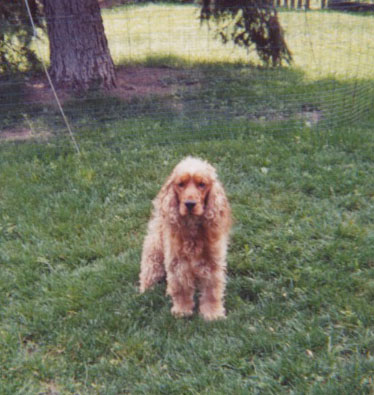
Cody is a red English Cocker Spaniel. He was 7 years old in March of 2009. He is one of three dogs in our family (two English Cocker Spaniels and one Sheltie). All three run in agility trials. Cody has severe food allergies. The only food his system can tolerate is Hills Z/D Ultra. We even have to use this food for treats. In October of 2008, Cody was diagnosed with PRA (progressive retinal atrophy). In December of 2008, the diagnosis was confirmed by his veterinary ophthalmologist, who consulted with Dr. Colitz and prescribed Ocu-GLO™. Because of his allergies, we were more than a little concerned about giving him anything other than his food. However, he has had no problems with the GelCaps.
Cody is due to see his veterinary ophthalmologist in December of 2009 for a check-up. Cody is still running in agility trials and has no problem with the jump heights or contacts. He is a very fast runner and often challenges the Border Collies in run time. Our Sheltie cannot keep up with him! A big thank you to all the wonderful and caring doctors and to your staff for giving us hope!
At the age of 5, Destiny was diagnosed with a retinal eye disease (progressive retinal atrophy). I was told she would be blind within 5 months. She is now 7-1/2 years old and can still see, thanks to Ocu-GLO™. I am so thankful she was able to receive this supplement. We live in Yuma, Arizona now but I still give her one Ocu-GLO™ GelCap each day and will continue to do so. Thank you so much!
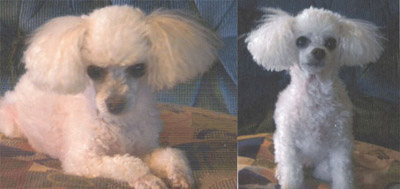
My Toy Poodle, Nicole, seems to have some sight preservation when she is taking Ocu-GLO™. This is definitely a plus!
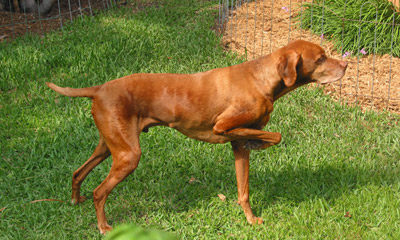
Amos, my lively and lovable 8-year-old Vizsla, was diagnosed with diabetes in December of 2007. After adjusting to the initial shock of twice daily insulin injections and then six more weeks to regulate his glucose levels and insulin dosage, we were referred to Dr. Carmen Colitz of the Animal Eye Specialty Clinic in West Palm Beach. Ignorant as I was, I was unaware that cataracts are a common complication of diabetes in dogs, and astonished to learn how quickly they can develop. My education came quickly.
Dr. Colitz gave my treatment-weary Amos a gentle but thorough exam and determined he did, in fact, have small cataracts already forming in both eyes. She prescribed Ocu-GLO™, which is rich in antioxidants like grapeseed extract, lutein and other nutrients that have demonstrated some success in reducing the formation of cataracts. Amos even likes the taste. We give them to him as a reward following his daily injections.
Here's the best part: so far, so good! I have continued to take Amos for exams at three- and six-month intervals, and to date - almost two years after his initial diagnosis - there has been no further development of his cataracts. My big, bouncing galoot of a dog continues to spot and point toward any bird foolish enough to land in our yard. (He even caught one a few weeks ago!)
Ocu-GLO™ is an eye treat/vitamin that deserves wide exposure. I'm grateful to be among those who can speak personally for its benefits.
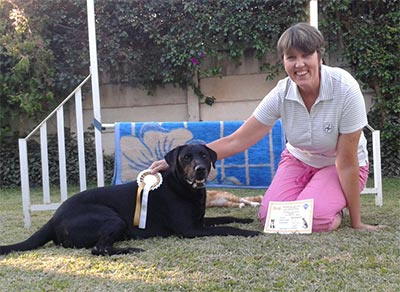
One evening in November 2014 my dog walked straight into my car! A couple of days later I took him to the vet and asked him to please check his eyes. After testing him for diabetes etc, the vet gave him an anti-inflammatory injection and told me to come back in a few days. However, a couple of days later the vet phoned to tell me my beloved Labrador cross, Nugget, had got PRA (progressive retinol atrophy). Having never heard of this before, I questioned the vet and read up everything I could find on the internet and was devastated to discover that the disease is hereditary and that in all probability within a year, my dog would be totally blind. Unfortunately here in Zimbabwe we have no facilities to test for PRA, so a blood test was taken and we were going to send this to South Africa at great expense, however the vet and I were absolutely convinced that this is what Nugget had as all the symptoms of night blindness etc were exactly what Nugget was experiencing. I was gutted as Nugget had only just turned 5 years old and was a young, active dog and he and I were just getting to grips with the new sport of dog agility which we were both loving.
My boyfriend's sister is a veterinary nurse in the United Kingdom, and she said the Opthamologist in the practice that she worked at suggested I put Nugget onto Ocuglo RX. She managed to send me out a bottle of tablets and I started Nugget on these on Boxing Day 2014. I realised that if I was to keep Nugget on these tablets, that I would have to find a regular supply of these however there was no supplier in Zimbabwe or South Africa who stocked these. I then contacted Animal Necessity in the USA directly and ordered six bottles of tablets to last Nugget for the next six months. We do not have pet insurance in Zimbabwe, so the cost is quite a lot of money to find each time, however I was willing to give it a try.
Facilities and specialized personnel are fairly limited in Zimbabwe with all our veterinarians being general vets and there is therefore, no way of measuring or knowing how quickly Nugget's eyesight is deteriorating. He is very blind at night and does walk into furniture etc especially if someone leaves a chair pulled out where it is not normally supposed to be. His eyes have the distinct shine to them that comes with PRA and he does struggle sometimes during the day if there is deep shade. He does not see holes in the ground so I have to just be aware of any when we are out for a walk. However …. my wonderful dog still competes in dog agility, dog jumping and obedience and is still being placed! Admittedly we do have our fair number of DQs as Nugget does not always see my hand signals, so it is a learning curve for both of us whilst we work out different ways to negotiate the obstacles. I do run most of the course with him and try to give him verbal commands as much as possible. He loves the A-frame but we do have to slow down over the dog walk and seesaw, however I am constantly amazed at how he still manages to negotiate these obstacles as they are fairly narrow. He does tend to leap quite a bit higher than is necessary over the hurdles (he makes sure he clears them!) and sometimes will jump even if there is no bar up between the wings.
Whilst I do understand that Ocuglo is not a cure for PRA, I do strongly believe that Ocuglo has slowed down Nugget's deterioration and is giving Nugget and I a bit longer to carry on doing what we both love doing – jumping!
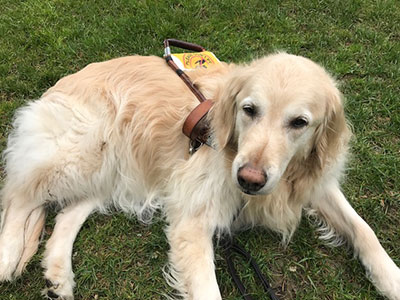
During the ACVO National Service Animal Eye Examination in May 2015, I was given scary news about my 5-year-old guide dog. Unfortunately, multiple iridociliary cysts were noted in each eye. Since my guide is a Golden Retriever, the biggest worry has been that the cysts might lead to pigmentary uveitis.
The ophthalmologist recommended that we start with oral supplements of Ocu-GLO, and that we watch things closely with follow up vision screenings. I am so thankful that Animal Necessity has worked with the Guide Dog Foundation for the Blind to help me give Brody Ocu-GLO every day for the past two years.
At our most recent eye exam, our ophthalmologist was thrilled to report again that Brody's eyes have remained stable, and his vision has not been impaired. My guide dog continues to be able to guide me, and we will celebrate his 7th birthday next month. Thank you Ocu-GLO!
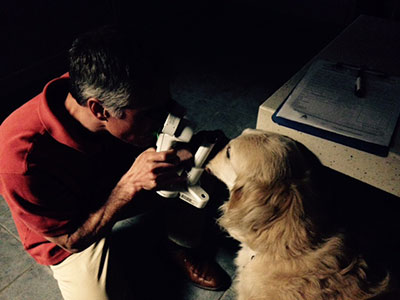
Disclaimer: Information provided by The Animal Necessity Veterinary Advisory Panel, and provided on the Animal Necessity website is not intended to replace a one-on-one relationship with a qualified health care professional and is not intended as medical advice. It is intended as a sharing of knowledge and information from the research and experience of Animal Necessity and the Veterinary community. Pet owners must make their own health care decisions for their pets, in partnership with their veterinarian. If your pet is pregnant, nursing, taking medication, or has a medical condition, consult your veterinarian before using any supplement products.


